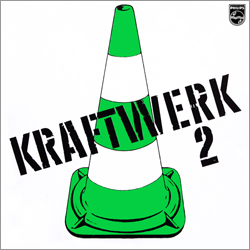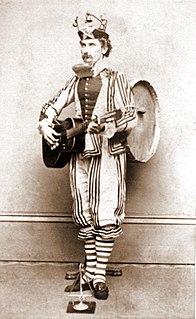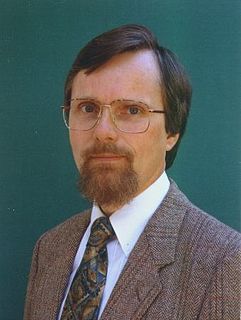Electronic music is a genre of music that employs electronic musical instruments, digital instruments, or circuitry-based music technology in its creation. It includes both music made using electronic and electromechanical means. Pure electronic instruments depended entirely on circuitry-based sound generation, for instance using devices such as an electronic oscillator, theremin, or synthesizer. Electromechanical instruments can have mechanical parts such as strings, hammers, and electric elements including magnetic pickups, power amplifiers and loudspeakers. Such electromechanical devices include the telharmonium, Hammond organ, electric piano and the electric guitar.

An electronic oscillator is an electronic circuit that produces a periodic, oscillating electronic signal, often a sine wave or a square wave or a triangle wave. Oscillators convert direct current (DC) from a power supply to an alternating current (AC) signal. They are widely used in many electronic devices ranging from simplest clock generators to digital instruments and complex computers and peripherals etc. Common examples of signals generated by oscillators include signals broadcast by radio and television transmitters, clock signals that regulate computers and quartz clocks, and the sounds produced by electronic beepers and video games.

A phase-locked loop or phase lock loop (PLL) is a control system that generates an output signal whose phase is related to the phase of an input signal. There are several different types; the simplest is an electronic circuit consisting of a variable frequency oscillator and a phase detector in a feedback loop. The oscillator's frequency and phase are controlled proportionally by an applied voltage, hence the term voltage-controlled oscillator (VCO). The oscillator generates a periodic signal of a specific frequency, and the phase detector compares the phase of that signal with the phase of the input periodic signal, to adjust the oscillator to keep the phases matched.

Tangerine Dream is a German electronic music band founded in 1967 by Edgar Froese. The group has seen many personnel changes over the years, with Froese having been the only constant member until his death in January 2015. The best-known lineup of the group was its mid-1970s trio of Froese, Christopher Franke, and Peter Baumann. In 1979, Johannes Schmoelling replaced Baumann. Since Froese's death in 2015, the group has been under the leadership of Thorsten Quaeschning. He was joined by violinist Hoshiko Yamane in 2011, Ulrich Schnauss in 2014 and Paul Frick in 2020.
Ambient music is a genre of music that emphasizes tone and atmosphere over traditional musical structure or rhythm. It may lack net composition, beat, or structured melody. It uses textural layers of sound that can reward both passive and active listening and encourage a sense of calm or contemplation. The genre is said to evoke an "atmospheric", "visual", or "unobtrusive" quality. Nature soundscapes may be included, and the sounds of acoustic instruments such as the piano, strings and flute may be emulated through a synthesizer.
In music, a loop is a repeating section of sound material. Short sections can be repeated to create ostinato patterns. Longer sections can also be repeated: for example, a player might loop what they play on an entire verse of a song in order to then play along with it, accompanying themselves.

In organology, the study of musical instruments, many methods of classifying instruments exist. Most methods are specific to a particular cultural group and were developed to serve that culture's musical needs. Culture-based classification methods sometimes break down when applied outside that culture. For example, a classification based on instrument use may fail when applied to another culture that uses the same instrument differently.

In music, tape loops are loops of magnetic tape used to create repetitive, rhythmic musical patterns or dense layers of sound when played on a tape recorder. Originating in the 1940s with the work of Pierre Schaeffer, they were used among contemporary composers of 1950s and 1960s, such as Éliane Radigue, Steve Reich, Terry Riley, and Karlheinz Stockhausen, who used them to create phase patterns, rhythms, textures, and timbres. Popular music authors of 1960s and 1970s, particularly in psychedelic, progressive and ambient genres, used tape loops to accompany their music with innovative sound effects. In the 1980s, analog audio and tape loops with it gave way to digital audio and application of computers to generate and process sound.

Kraftwerk 2 is the second studio album by German electronic band Kraftwerk, released in January 1972.

A one-man band is a musician who plays a number of instruments simultaneously using their hands, feet, limbs, and various mechanical or electronic contraptions. One-man bands also often sing while they perform.
Matthias Ziegler is a Swiss flautist and professor of flute who specializes in contemporary music for various sizes of flute.
EWI is a type of wind controller, an electronic musical instrument. The EWI was invented by Nyle Steiner, his second electronic wind instrument design. Steiner originally brought to market a brass style fingering analogue wind synthesizer instrument known as the EVI in the 1970s. Steiner then went on to develop the EWI which had a unique fingering system closer to the woodwind style. These instrument designs first working models appeared in the 1970s, with the EWI appearing commercially during the early 1980s.

Cyclone is the eleventh major release and eighth studio album by Tangerine Dream and the first in their canon to feature proper vocals and lyrics. The cover is a painting by band leader Edgar Froese.

The music of the ancient Mayan courts is described throughout native and Spanish 16th-century texts and is depicted in the art of the Classic Period. The Maya played instruments such as trumpets, flutes, whistles, and drums, and used music to accompany funerals, celebrations, and other rituals. Although no written music has survived, archaeologists have excavated musical instruments and painted and carved depictions of the ancient Maya that show how music was a complex element of societal and religious structure. Most of the music itself disappeared after the dissolution of the Maya courts following the Spanish Conquest. Some Mayan music has prevailed, however, and has been fused with Spanish influences.

Silur is the second full-length release by Tarwater, an electronic music group from Berlin, Germany. The album debuted on September 28, 1998. The album combines spartan spoken-word narration with ambient, electronic music. The music mainly consists of looped samples layered with live instruments. The instruments used were not those commonly used in pop-rock music. For example, the flute is commonly used throughout the album.
Bernhard Lang is an Austrian composer, improviser and programmer of musical patches and applications. His work can be described as contemporary classical, with roots, however, in various genres such as 20th-century avant-garde, European classical music, jazz, free jazz, rock, punk, techno, EDM, electronica, electronic music, and computer-generated music. His works range from solo pieces and chamber music to large ensemble pieces and works for orchestra and musical theatre. Besides music for concert halls, Lang designs sound and music for theatre, dance, film and sound installations.

Klang —Die 24 Stunden des Tages is a cycle of compositions by Karlheinz Stockhausen, on which he worked from 2004 until his death in 2007. It was intended to consist of 24 chamber-music compositions, each representing one hour of the day, with a different colour systematically assigned to every hour. The cycle was unfinished when the composer died, so that the last three "hours" are lacking. The 21 completed pieces include solos, duos, trios, a septet, and Stockhausen's last entirely electronic composition, Cosmic Pulses. The fourth composition is a theatre piece for a solo percussionist, and there are also two auxiliary compositions which are not part of the main cycle. The completed works bear the work (opus) numbers 81–101.

Kathinka Pasveer is a Dutch flautist.

Howard J. Buss is an American composer of contemporary classical music. Buss’ works include instrumental solos, chamber music, symphonic, choral, and band works. His music has received awards, including from the 2011 Lieksa Brass Week Composition Competition in Finland, the 2015 American Trombone Workshop National Composition Competition, the National Flute Association’s Newly-Published Music Competition, the Erik Satie Mostly Tonal Award, State of Florida Fellowships, ASCAP Plus Awards., and The American Prize.
Falk Grieffenhagen is a German musician who is a member of the electronic/experimental pop band Kraftwerk.












